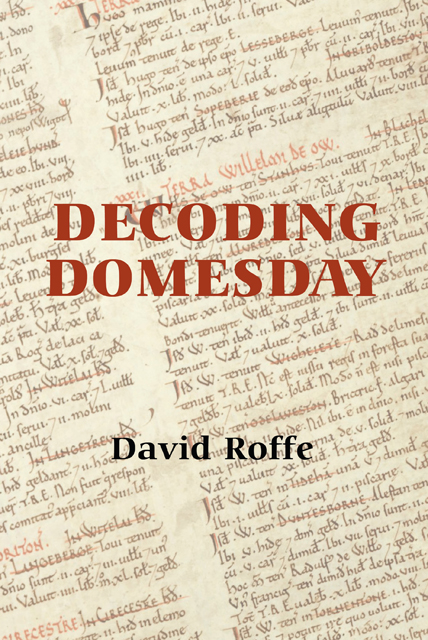Book contents
- Frontmatter
- Contents
- Tables
- Dedication
- Preface
- Acknowledgements
- Abbreviations
- 1 Domesday Past and Present
- 2 The Domesday Texts
- 3 The Inquest and the Book
- 4 The Domesday Boroughs
- 5 Lordship, Land, and Service
- 6 The Vill and Taxation
- 7 The Economy and Society
- 8 The Communities of the Shire
- 9 The Beyond of Domesday
- 10 Domesday Now
- Appendix The main entry forms of GDB
- Bibliography
- Index
5 - Lordship, Land, and Service
Published online by Cambridge University Press: 10 March 2023
- Frontmatter
- Contents
- Tables
- Dedication
- Preface
- Acknowledgements
- Abbreviations
- 1 Domesday Past and Present
- 2 The Domesday Texts
- 3 The Inquest and the Book
- 4 The Domesday Boroughs
- 5 Lordship, Land, and Service
- 6 The Vill and Taxation
- 7 The Economy and Society
- 8 The Communities of the Shire
- 9 The Beyond of Domesday
- 10 Domesday Now
- Appendix The main entry forms of GDB
- Bibliography
- Index
Summary
Lordshipwas central to Domesday Book and clearly important in the Domesday inquest. Its nature both before and after the Conquest has been a major concern of politicians and historians alike from at least the mid thirteenth century when Matthew Paris opined ‘here the manifest oppression of England began’. Various notions have collided in the debate: the free Saxons and the Norman yoke, anarchy and reason, native and foreign, innocence and experience. Steering a course through the minefield is one of the greatest challenges in Anglo- Norman history. All agree that King William replaced the Old English aristocracy with his followers, but otherwise there has been little common ground.
As in much else, Round has set the terms of the debate. He argued forcibly that knight service was a post-Conquest phenomenon and further that it was introduced by William the Conqueror. No one now would accept that the system was introduced at one fell swoop (Round seems to have believed it was more or less in place by 1086 in its entirety). Research in the last fifty years or so has demonstrated that the Norman settlement was far more protracted than previously thought, extending well into the reign of Rufus and even Henry I in the North. The formation of the honours of the twelfth and thirteenth centuries was incomplete in 1086 and feudal customs were not established. The Domesday inquest was, in part, responsible for definition of much that was inchoate, but feudal lordship was a twelfth-century construct. All of this, though, was merely a refining of Round's essential thesis. The concept of knight service, personal attendance on a lord in return for land, was generally seen as a Norman importation.
For the most dyed-in-the-wool Normanists this was self-evident. Normans fought on horseback and to do so needed a warhorse and chain mail birnie. Such equipment was beyond the means of the ordinary free man and so lordship over men and land was a necessary corollary for the accumulation of enough capital to purchase them. The castle, where donjon originally meant lord and keep, became at once the symbol of that lordship and the home of the lord. Feudalism was defined by the mounted knight and the castle and neither was known in pre- Conquest England. Domesday appears to put flesh on this skeleton.
- Type
- Chapter
- Information
- Decoding Domesday , pp. 144 - 182Publisher: Boydell & BrewerPrint publication year: 2015



